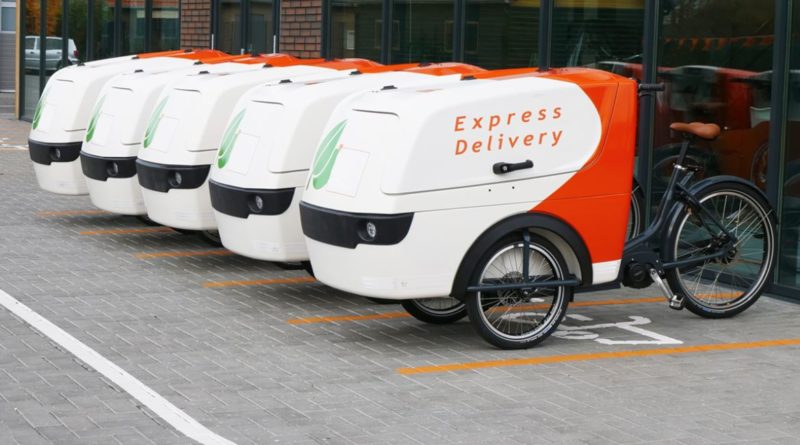Local Government Association report urges business “trade vans for cargo bikes”
England and Wales’ Local Government Association has published a new report calling on couriers and small business to trade in vans for environmentally friendly cargo bikes specifically for “last mile” deliveries.
Coming at a time when the cargo bike segment is racking up column inches due to trend changes for inner city logistics, the new report emphasises that commercial vehicle traffic is already back north of pre-pandemic levels and only likely to increase. This was illustrated earlier this week in a CI.N assessment of the traffic patterns, where vans and HGVs were indeed accelerating road use north of pre-Covid trends.
The study is significant as it comes from a central body with influence over councils nationwide. The recommendations come within the Transport Decarbonisation by Travelling Less report, which flags sustained use of diesel vans in particular as a problematic contributor to poor air quality in residential and town centre streets.
Within the report an estimate is given that cargo bikes could replace up to ten percent of conventional van deliveries where the final leg of the parcel’s journey is no more than 2 kilometres. This recommendation is for current “network efficiency”, without any infrastructure adjustments. The report adds that, over its the life cycle of a light electric vehicle, transport emissions could be chopped by 73%.
As reported earlier this week, London’s Cross River Partnership has been promoting the use of cargo bikes by small traders. Coopers Bakehouse in south-east London has saved 3,825kg of CO2 per year and £1,300 by switching to cargo bikes from white vans. London Smoke & Cure from Streatham has saved 89.6kg of CO2 and also improved staff wellbeing.
The report references Holland, Germany and Denmark, where businesses have been quick to understand the benefits of adjusting their last mile delivery habits. An existing culture of cycling is more prevalent in these countries when compared to the UK, however, so it is likely that significant political will at a national and local level will be required to bring about the improvements in air quality sought.
“In addition, the bikes will help to tackle the issue of delivery vans clogging up road and in some cases pavement space as they make deliveries in smaller residential streets,” says the LGA, referencing the amount of street space taken up by large vans.
Eighteen councils have thus far secured funding from the £2m e-Cargo Bike Grant Fund to support the purchase of e-Cargo bikes. The scheme is funded by the Department for Transport and delivered by Energy Saving Trust.
Cambridgeshire City Council will now deploy 30 e-Cargo bikes as part of an initiative to showcase the potential benefits to residents and business owners. The scheme will work via a leasing scheme attached to the pool of bikes.
Further south, Devon County Council have responded by providing Exeter with 13 e-Cargo bikes to support active business travel as an alternative to van use. Two of the bikes will be utilised by the local hospital’s adult and social care teams to reach some of the city’s most isolated people.
Likewise, Nottingham City Council is offering a try before you buy rental scheme for any business interested in unlocking the potential.
Cllr David Renard, LGA transport spokesperson, said: “Courier firms have played a vital role during the coronavirus crisis in continuing to provide a delivery service while people have been unable to get out and about as they would in normal times.
“Online shopping will continue to grow, and so will our reliance on courier services.
“This has unfortunately seen the consequence of large delivery vans clogging up street space, increasing congestion and in some cases causing a rise in air pollution.
“We need to look at how we manage online deliveries in the future and consider new delivery options which are more climate and road-friendly.
“Swapping large vans for cargo bikes is one way in which we can make a really positive difference to our environment and help achieve the country’s carbon reduction targets.”
For those businesses considering the shift, chair of the European Cargo Bikes and Cycle Logistics Experts Group Richard Armitage points out that the benefits are many-fold; no parking fines; no parking restrictions; free flowing even when there is heavy traffic; and able to access areas where cars and vans are not permitted.
Earlier today, LEVA-EU revealed that the UK’s Transport Research Laboratory is working on a European Commission study that will ask whether the correct regulations apply to light electric vehicles. Described as a “landmark” shift, if regulations are adapted to better suit the vehicle size and weight, many in the trade believe the industry could unlock the full potential of the sector, as would be the case with speed pedelecs.
A full insight in to the LGA’s briefings on the matter can be found here, while a webinar will follow up with interested stakeholders on November 24th at 10.30am. You can sign up for that here.
(Pic courtesy of Pure Electric)



